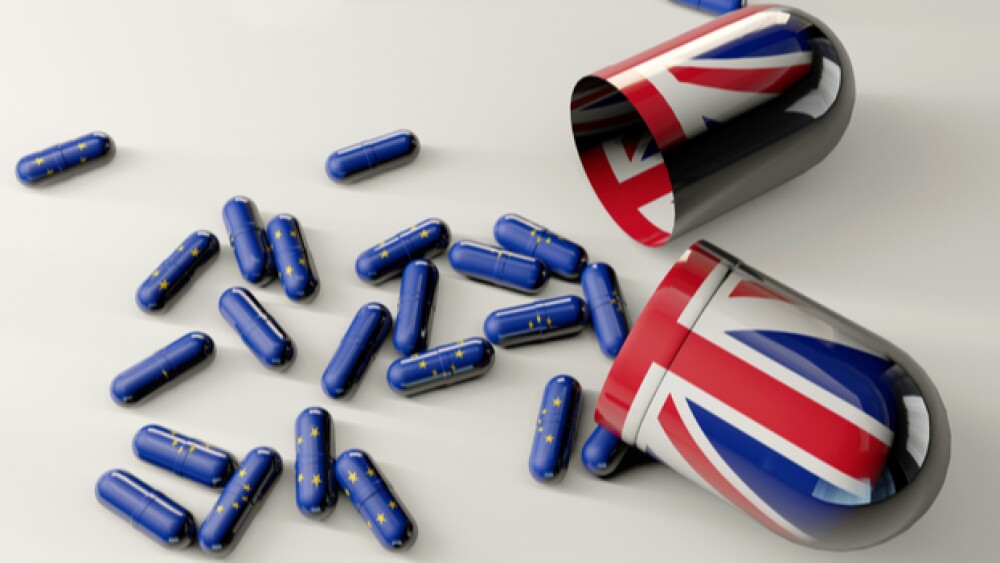The UK’s exit from the European Union, Brexit, will impact numerous industries in the UK and Europe, but the biopharma industry has its own unique challenges.
The UK’s exit from the European Union, Brexit, will impact numerous industries in the UK and Europe, but the biopharma industry has its own unique challenges. Almost by definition, drug companies in the UK market their products out of the country. And in a major complication for the industry globally, is that the European Medicines Agency (EMA), the EU’s equivalent of the U.S. Food and Drug Administration (FDA), is moving out of London to Amsterdam.
Although the EMA is expected to move on January 1, 2019, the goal is for the staff to be in a new temporary building in Amsterdam by March 30 at the latest. However, approximately 30 percent of staffers are expected to leave the agency, which has already forced the agency to limit its activities.
PharmaTimes notes, “Once the EMA has gone it will become wholeheartedly an EU institution, with no direct responsibility for the UK’s medicines supply. That burden will fall on the UK’s MHRA, whose experts are already being excluded from the EMA’s work. Most international pharma companies will not find it so easy to make the split, however.”
A recent announcement of a Withdrawal Agreement that was released in a draft—all 585 pages of it—includes details about the financial settlement both Europe and the UK agreed on months ago. It is dubbed by many “the divorce bill” and spells out that the UK will pay at least 39 billion pounds to the EU to cover its financial obligations. It’s sort of a lengthy framework of how the separation might occur, but it’s just a draft.
The entire event was overshadowed by the resignation of Brexit Secretary Dominic Raab the day after the agreement was announced, which was followed by the resignation of several Cabinet Ministers. There is also quite a bit of doubt as to whether UK Prime Minister Theresa May can get the agreement approved by parliament.
The UK government has told drug companies they should stockpile another six weeks of drugs. That is presumably on top of the stockpiles companies were already making in August. At that time, AstraZeneca, headquartered in Cambridge, UK, indicated it was stockpiling about 20 percent of its drugs. Sanofi, AstraZeneca, Novartis and Roche, from France, UK, and Switzerland (Novartis and Roche), respectively, have all taken steps to stockpile drugs to avoid supply chain problems or drug shortages. Novo Nordisk, headquartered in Denmark, a leading manufacturer of insulin for diabetics, plans to hold a 16-week stockpile starting in January, an increase from its usual seven-week supply.
In August, Reuters wrote, “More than 2,600 drugs have some stage of manufacture in Britain and 45 million patient packs are supplied from the UK to other European countries each month, while another 37 flow in the opposite direction, industry figures show.”
Of the Withdrawal Agreement, the Association of the British Pharmaceutical Industry (ABPI) called it an “important step towards securing a Brexit deal.”
However, they also recognize that the Withdrawal Agreement only really covers the transition period, meaning it’s not a long-term fix or anything really like negotiated contracts. For the pharma industry, at least, it does mean the drug companies will be able to continue to supply medicines to patients without delay or disruption when the Brexit occurs in March … hopefully.
And although the ABPI was being diplomatic, others in the industry are not as pleased. Richard Greville, the Welsh branch director of the ABPI called the current deadlock a “challenge.”
Pharma Phorum noted that pharmaceutical companies are vulnerable to any changes enforced by Brexit because they are currently regulated by the EMA. “This is likely to change after Brexit, with a worst-case scenario being the UK regulator taking on all the work previously done by the EMA,” the Phorum wrote.
And in that situation, pharmaceutical companies would have to negotiate new drugs in the EU and separately in the UK, as well as dealing with any trade restrictions that could come out of a no-deal scenario. Greville argues that this could lead to extra costs and delays in getting drugs to patients in Wales.
“Because of the global nature of the industry, the supply, the frictionless movement of goods is absolutely critical,” Greville told Pharma Phorum, “because some medicines are manufactured in the UK, some medicines are manufactured in the EU and some medicines are manufactured in the rest of the world.”
Greville noted that some companies are spending as much as 100 million pounds to prepare for Brexit. “It would be a great pity if it was entirely wasted but perhaps, more importantly, the waste would have been best spent in developing and creating new medicines, which would have been of far greater use to patients across the world.”
And it’s not as if stockpiling drugs will solve all the problems. Reuters notes that smaller biopharma companies may not have the cash to build up significant extra supplies, and some specialist drugs and biologics have short shelf lives.
So pharma companies are spending millions of dollars (or pounds and euros) on stockpiling drug supplies, hoping that the EU and UK will work out and approve a realistic approach.
Pharma Times writes, “For AstraZeneca, that means increasing its drug stockpiles by around 20 percent, as well as setting up parallel testing, licensing and supply systems in the UK and the EU. GSK (GlaxoSmithKline) is making similar preparations, as are Sanofi and Novartis. Smaller UK companies, which do not already have an EU office, face the unwelcome choice between setting one up or finding a willing EU partner. The costs of this work are considerable: AstraZeneca says it is spending $40 million on the stockpiling alone, while GSK and Pfizer reckon the total cost at up to $100 million.”





